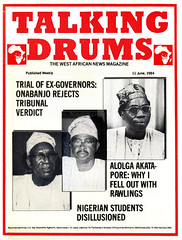Music And Arts Scene
Bongo Man's Sweet Vibes
KANDA BONGO MAN: 'Amour Fou' (KANDA BONGO MAN BM 0055) 'Amour Fou' Bella-Bella Elombe'/'Ekipe' 'Bayembi'.
As Gaspard Vouaye (a Congolese journalist) writes at the back of the album sleeve, Kanda Bongo Man needs no introduction but his latest album needs it probably because it is under his own label and more importantly it has a lot of pleasant surprises.After sweeping across Africa, Europe and the Caribbean world with his honeyed voice and music on the 'Djessy' and 'Iyole' albums, Kanda Bongo Man approaches this album from a slightly different angle: 'Amour Fou' (mad love) is under his own label (apparently frustrated by having been previously ripped off by some French producers) and the introduction of synthesizers in the music (Franco would disagree with him). His music has not suffered in any way in spite of these changes.
The guitar riffs are alive even from the beginning of 'Amour Fou'. As a young man and unmarried, Kanda Bongo Man has learnt to express himself emotionally in English to say 'I love you' which he slips in this title track. You are briefly forewarned by the synthesizer and the bass guitar to prepare for the usual Zairean 'animation à la guitare'. In his exuberant mood, Kanda Bongo Man invites the listener to dance with him tonight but you are more likely to want to do so all the time. The synthesizer touch as the music dies off is a novelty worth noticing.
It is not strange that Kanda Bongo Man begins 'Bella-Bella Elombe' in a rumba tempo - this is typical of Zairean music. Your appetite for dancing suddenly gets satisfied when the real thing gets under way: souk- ouss. You are encouraged to 'advance' your steps as soon as Kanda Bongo Man says so. Didlo's guitar riffs and licks compound the situation for you to let yourself go.
'Ekipe' reminds me of 'Iyole' due mainly to the vocal approach but the guitar works sound different and more merciless here. It is certainly one of the best tracks (and don't forget 'Amour Fou') on the album. Look for evidence with the change of style half-way through with the help of the bass line and the synthesizer.
The beginning of 'Bayembi' may sound a bit dull and un-Zairean but you will not have to wait too long before Kanda Bongo Man calls on Didlo who treats the guitar with compassion.
What is certain is that by the time the needle travels to the end of all the tracks you're hooked to Kanda Bongo Man who will complete your party with this lovely album.
SAM FAN THOMAS: 'Makassi' (TAMWO RECORDS TAM 4) Mole' 'Makassi (suite)' 'Ngouze'/African Typic Collection' 'Sabina' 'Mogwe'.
The music of the United Republic of Cameroons is unfortunately unknown to London except that of the legendary Manu Dibango and probably Toto Guillaume and Francis Bebey. There are, however, some young ones who have suddenly decided to propagate the Makossa gospel. One of such talents is Sam Fan Thomas whose 'African Typic Collection' on this album has caused a lot of sensation throughout Francophone West and Central Africa especially during the recent African Cup football competition in the Ivory Coast which was incidentally won by the Cameroonians.Thomas' new Makossa sound is a revolution which has gradually slipped into Cameroonian music. Like most Francophone albums the sleeve in formation is either non-existent or misleading. The fact of dedicating 'Mogwe' to all children of the Makassi group would have us believe that Makassi is the name of the band (or is it probably a movement?)
'Mole' is the album opener which sets the atmosphere for dancing rather early. At the background of rhythm guitar the horns flash intermittently with arrangements that allow the chorus to slot in beautifully.
Doing 'Makassi (suite)' in English will obviously help Thomas to reach another section of the international audience especially with the rhythmic fashion in which the tune is done. The guitar works and the strong bass line adequately support Thomas' message: everybody listens to music.
The attempt at smoocher in a 'Ngouze' is fortunately successful despite what some critics and purists might think, namely, that the music is not African enough.
The B-side begins with the hit tune African Typic Collection that reminds me of Bunny Mack. The strong bass line and the pedantic drums joined in by the short sharp horns invite your feet with so much power. When the voices join in the scene is already set for a party. Half-way through the track the music changes, not necessarily for the better but the vocal call-and-answer injects a different style into a music that is already going well enough.
The happy music continues in 'Sabina' in which the guitar attempts to sparkle in the Zairean way; after all, the music sometimes sounds Zairean except that the guitars do not have the same sharpness.
'Mogwe' may not sound too differ ent from the rest of the tracks on the album but on balance the album lends itself pretty well both for party and listening. Even the occasionally monotonous way of combining singing with instruments do not take away the overall appeal of the album in general.
